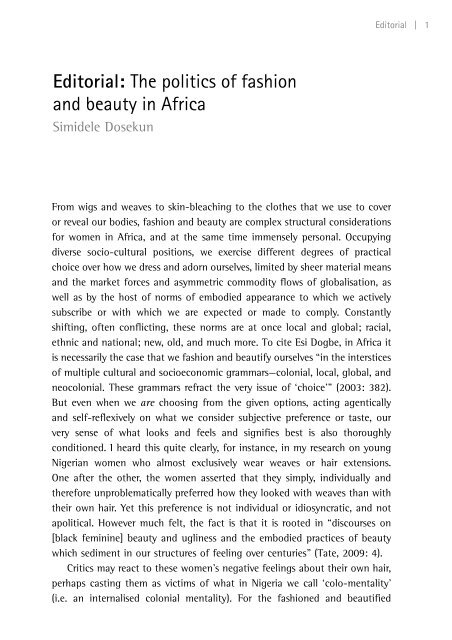The politics of fashion and beauty in Africa
fa21_proof_3
fa21_proof_3
Create successful ePaper yourself
Turn your PDF publications into a flip-book with our unique Google optimized e-Paper software.
Editorial | 1<br />
Editorial: <strong>The</strong> <strong>politics</strong> <strong>of</strong> <strong>fashion</strong><br />
<strong>and</strong> <strong>beauty</strong> <strong>in</strong> <strong>Africa</strong><br />
Simidele Dosekun<br />
From wigs <strong>and</strong> weaves to sk<strong>in</strong>-bleach<strong>in</strong>g to the clothes that we use to cover<br />
or reveal our bodies, <strong>fashion</strong> <strong>and</strong> <strong>beauty</strong> are complex structural considerations<br />
for women <strong>in</strong> <strong>Africa</strong>, <strong>and</strong> at the same time immensely personal. Occupy<strong>in</strong>g<br />
diverse socio-cultural positions, we exercise different degrees <strong>of</strong> practical<br />
choice over how we dress <strong>and</strong> adorn ourselves, limited by sheer material means<br />
<strong>and</strong> the market forces <strong>and</strong> asymmetric commodity flows <strong>of</strong> globalisation, as<br />
well as by the host <strong>of</strong> norms <strong>of</strong> embodied appearance to which we actively<br />
subscribe or with which we are expected or made to comply. Constantly<br />
shift<strong>in</strong>g, <strong>of</strong>ten conflict<strong>in</strong>g, these norms are at once local <strong>and</strong> global; racial,<br />
ethnic <strong>and</strong> national; new, old, <strong>and</strong> much more. To cite Esi Dogbe, <strong>in</strong> <strong>Africa</strong> it<br />
is necessarily the case that we <strong>fashion</strong> <strong>and</strong> beautify ourselves “<strong>in</strong> the <strong>in</strong>terstices<br />
<strong>of</strong> multiple cultural <strong>and</strong> socioeconomic grammars—colonial, local, global, <strong>and</strong><br />
neocolonial. <strong>The</strong>se grammars refract the very issue <strong>of</strong> ‘choice’” (2003: 382).<br />
But even when we are choos<strong>in</strong>g from the given options, act<strong>in</strong>g agentically<br />
<strong>and</strong> self-reflexively on what we consider subjective preference or taste, our<br />
very sense <strong>of</strong> what looks <strong>and</strong> feels <strong>and</strong> signifies best is also thoroughly<br />
conditioned. I heard this quite clearly, for <strong>in</strong>stance, <strong>in</strong> my research on young<br />
Nigerian women who almost exclusively wear weaves or hair extensions.<br />
One after the other, the women asserted that they simply, <strong>in</strong>dividually <strong>and</strong><br />
therefore unproblematically preferred how they looked with weaves than with<br />
their own hair. Yet this preference is not <strong>in</strong>dividual or idiosyncratic, <strong>and</strong> not<br />
apolitical. However much felt, the fact is that it is rooted <strong>in</strong> “discourses on<br />
[black fem<strong>in</strong><strong>in</strong>e] <strong>beauty</strong> <strong>and</strong> ugl<strong>in</strong>ess <strong>and</strong> the embodied practices <strong>of</strong> <strong>beauty</strong><br />
which sediment <strong>in</strong> our structures <strong>of</strong> feel<strong>in</strong>g over centuries” (Tate, 2009: 4).<br />
Critics may react to these women’s negative feel<strong>in</strong>gs about their own hair,<br />
perhaps cast<strong>in</strong>g them as victims <strong>of</strong> what <strong>in</strong> Nigeria we call ‘colo-mentality’<br />
(i.e. an <strong>in</strong>ternalised colonial mentality). For the <strong>fashion</strong>ed <strong>and</strong> beautified



